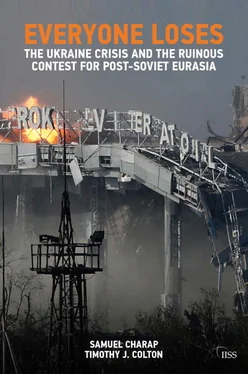But it was the colour revolutions of 2003–05, and most of all Ukraine’s Orange Revolution in 2004, that truly kicked off the unravelling of the Cold Peace. Breakdowns of regimes that were part of the status quo order in the region testified to a waning of Russian influence. The instinct of Russia and the West to respond to these breakdowns in opposite and opposing ways also pointed to more hard-hitting competition on the horizon.
The colour revolutions solidified linkages between geopolitics and geo-ideas in the region. Moscow came around to the interpretation that the uprisings next door were a tool of Western, and pointedly of American, policy. The tool was deployed, many in positions of authority argued, in order to remove sitting governments that pursued policies counter to US interests, replace them with figures who would do the Americans’ bidding, or conceivably, if all else failed, to sow sheer disorder. According to this view, colour revolutions were particularly insidious because they furthered power objectives under the cover of devotion to universal principles of democracy and human rights – what the Russians call maskirovka (camouflage). The West’s geo-ideas, in short, were geopolitics in disguise. [2] See presentations by Minister of Defence Sergei Shoigu, Foreign Minister Sergei Lavrov and Chief of the General Staff Valerii Gerasimov at the 3rd annual Moscow Conference on International Security, available at http://mil.ru/mcis/2014.htm . For an English-language summary, see http://eng.mil.ru/files/MCIS_report_catalogue_final_ENG_21_10_preview.pdf .
The Russian military developed a detailed schematic for this purported policy, beginning with Western government sponsorship of efforts to train opposition movements, moving to the process of delegitimising sitting governments, sparking protests and so on until the final act of installation of a puppet regime. [3] Valerii Gerasimov, ‘Tsennost’ nauki v prognozirovanii’, Voenno-promyshlennyi kur’er , 5 March 2013.
Incongruities abounded in the Russian narrative. We mention just three here. Firstly, the popular uprisings in question originated predominantly in domestic outrage about poor governance, not intrigues by foreigners. Secondly, they occurred under a tangle of circumstances and led to very different outcomes. In Georgia, Russia was far more involved in mediating the political crisis than any Western country. In Kyrgyzstan, the successor government under Kurmanbek Bakiev behaved no differently toward Russia or the West than the ancien r é gime . In Ukraine (see below), Western-sounding rhetoric outpaced Western-tending policy. Thirdly, the degree of Western involvement in the uprisings and the extent to which Washington in particular guided the aftermath was grossly overstated.
The blemishes and blinkers in the Russian narrative are beside the point. Threat perceptions do not need to be logically consistent; they matter to the extent that they are widely held in a country’s political establishment. It became a consensus view in Moscow that the West, beginning with the United States, was fomenting colour revolutions in post-Soviet Eurasia as a non-kinetic means of engineering the same result as Operation Iraqi Freedom did in Iraq: regime change. And, to be fair, there were kernels of truth in the Russian narrative. The US and the EU did provide training to some of the activists and parties that came to power as a result of the revolutions, and often were involved in brokering political compromises. [4] As Michael McFaul notes, the foreign democracy-promotion wings of both of the United States’ national political parties were deeply involved in Ukrainian events in 2004: ‘That there were purposive efforts by both IRI [the International Republican Institute] and NDI [the National Democratic Institute] to strengthen Our Ukraine’s [Yushchenko’s party] campaign abilities is without question.’ Michael McFaul, ‘Ukraine Imports Democracy: External Influences on the Orange Revolution’, International Security , vol. 32, no. 2, Fall 2007, p. 74.
Moreover, some US officials did claim credit for these events, although sometimes the very same individuals would also downplay the American role. [5] Lincoln A. Mitchell, The Color Revolutions (Philadelphia, PA: University of Pennsylvania Press, 2012), p. 86.
And in the cases of the Rose and Orange revolutions, as well as in later upheavals in the region, the governments that emerged were indisputably more pro-Western, loosely speaking, than their predecessors. In Ukraine, president Yushchenko and Yulia Tymoshenko, his co-revolutionary prime minister, had for some time been proponents of NATO and EU membership and opposed closer ties with Russia. When they came to power, there truly was a swing in Ukrainian foreign policy. Kuchma had attempted to balance between Russia and the West so as to maximise benefits; the new government tacked sharply toward the West.
Domestic politics in the region had thus become an arena of Russia–West contestation. It was a matter of geo-ideas as much as geopolitics. For Moscow, the struggle was linked to preservation of domestic stability, since it was widely taken as gospel truth that political change in the neighbourhood could be used to undermine the foundations of the Russian government. For the West, the colour revolutions also solidified a linkage between geopolitics and geo-ideas. ‘Pro-Western’ became synonymous with ‘democratic’ as a descriptor of local political forces. Democratic political change and geopolitical gain went hand in hand, and many saw Russia as an impediment to both.
This mode of thinking was quite familiar to many Western policymakers: in East Central Europe, democratisation and market reforms had coincided with geopolitical realignment in their favour. The circumstances of post-Soviet Eurasia were markedly different, and the assumed linkage with geo-ideas often led Western policy astray. In the end, none of the colour revolutions was a genuine democratic breakthrough. [6] See Henry E. Hale, Patronal Politics: Eurasian Regime Dynamics in Comparative Perspective (Cambridge: Cambridge University Press, 2014).
Kyrgyzstan, which was little involved in the Russia–West tussle, was more repressive under Bakiev than it had been under Akaev, and in 2010 Bakiev was to be overthrown much like his predecessor. Post-Orange Revolution Ukraine was less repressive than under Kuchma, but its leaders were anything but democratic exemplars, often behaving quite similarly to their predecessors. Many corrupt practices continued unabated, and precious little was done to establish the rule of law. In Georgia, governance under Saakashvili’s administration did make impressive strides, especially in terms of anti-corruption policy, but pluralism and human rights did not. Any illusions should have been put to rest by a crackdown on protesters and subsequent takeover of the country’s main independent television station in November 2007. While the West often claimed to be shunning authoritarian regimes for their authoritarianism, not infrequently, as with Georgia in 2007, it overlooked the democratic shortcomings of governments that vowed their loyalty. [7] It is conceivable that in Georgia the cosy relationship with the Bush administration actually encouraged nondemocratic behaviour, by leading Saakashvili to think he could mistreat local opponents without objection from external patrons.
In the years following the colour revolutions, Russia moved towards a counter-revolutionary regional policy. This has been widely misconstrued as a drive to sabotage democratic norms. [8] See, for example, Nicolas Bouchet, ‘Russia and the Democracy Rollback in Europe’, The German Marshall Fund of the United States, 26 May 2016, http://www.gmfus.org/publications/russia-and-democracy-rollback-europe .
The evidence to support such claims is thin. Russian policymakers, whose cynicism often seems to know no bounds, do not see their neighbourhood principally through an ideological lens. Their objective instead is to have druzhestvennye (friendly) neighbours, that is, states whose leaders are not hostile to Russia. How these leaders get to power and how their political institutions function is of little concern. As one of us has written, ‘Russia has been more indifferent to authoritarianism in its former empire – homegrown, for the most part – than avidly supportive of it. There is no systematic correspondence between regime type and the relationship with Russia.’ [9] Timothy Colton, ‘Sources and Limits of Russia’s Influence in Post-Soviet Eurasia’, paper presented at the Annual Meeting of the American Political Science Association, Seattle, WA, 3 September 2011, p. 11.
Moscow’s counter-revolutionary turn was driven by the notion that revolutionary change had become a Western implement to undermine Russian interests. Moscow could no longer distinguish (what the West couched as) democratic change from loss of influence. Geopolitics and geo-ideas were now hopelessly entangled. As events were to demonstrate, the mix was highly combustible.
Читать дальше











